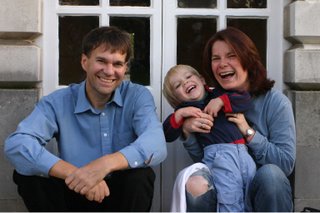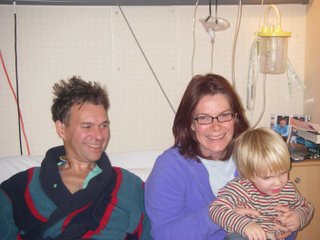You could say it was obvious that Dr Savage was going to be less chirpy than Father Christmas. In the roller coaster that is cancer treatment, we had a sobering morning after our optimistic start to the week.
Dr Savage is one of the specialist oncologists (Cancer Specialist). He wasn't savage - he was very nice - but a few hard facts hit home for Quentin this morning. The situation in general is as follows:
- There is no cure for kidney cancer. This is "a very serious illness".
- Chemotherapy and radiotherapy do not work for kidney cancer.
- Immunotherapy is the "standard" treatment, albeit with a low success rate.
- There is now one other "text book" treatment called serafanib which they feel optimistic about.
- There are some other experimental treatments (including the vaccine we read about yesterday)
- The treatment will aim to keep the illness under control for a "good number of years" but that cannot be guaranteed.
He confirmed that the speckles are very small and there is a possibility that they may not be deposits, but said we have to assume they are, at this stage.
Which therapy to go for.Immunotherapy is not offered to all patients as it doesn't have a great success rate. Only 15% of those treated get a real benefit. In a few cases the cancer reduced considerably or seemed to disappear, but generally the benefit is a question of extending life.
Quentin will be offered immunotherapy. He is young, does not have detectable deposits in his bones or brain and those in his lungs are small. This makes him a good profile for the treatment.
Serafanib has a greater success rate. 50% of those treated see a benefit,
but the benefit is not as great as with immunotherapy. (Although the drug has only been licensed for 6 months, they know this from the trials they have done over the last 5 years).
The other drugs / vaccines are not licensed yet. Dr Savage's view was that they often sound miraculous at the very early stages of trials, but rarely does the news remain as positive as they move through years of testing towards being a licensed drug. Trovax etc are many steps down the line.
Dr Savage's recommendation was to try immunotherapy first and then to move onto serafanib. Hopefully this will be a couple of years - or even more - down the line ... by which time, who knows what the kidney cancer landscape will look like. He did stress that if Quent had been diagnosed 5 years ago, there was only immunotherapy, whereas now they have two therapies they have confidence in, so it is definitely good we are in 2006.
What is entailed?Firstly we monitor the speckles. They can only do CT scans every few months (because of the radiation) and in between they do chest x-rays, which are not as accurate, but would pick up any major changes. Quent had a chest x-ray today and will probably have another CT scan in December.
We start immunotherapy if the speckles change or if Quent becomes unwell (tiredness, pain, coughing, shortness of breath).
The treatment involves injections under the skin of a combination of interleuken, interferon and 5FU. Much of the treatment can be done at home but some has to be supervised in hospital because of side effects (tiredness, feeling very hot, swelling in feet).
What can we do?Stay healthy, confident and happy. Be optimistic that after treatment the cancer will behave like a chronic illness which can be controlled.
Next Friday, we see Professor Gore for his take. If
his name is anything to go by, I will probably faint in that consultation!



